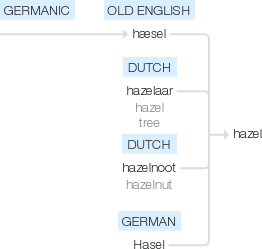Hazel
Old English hæsel, of Germanic origin; related to Dutch hazelaar ‘hazel tree’, hazelnoot ‘hazelnut’, and German Hasel, from an Indo-European root shared by Latin corylus .
wiktionary
From Middle English hasel, from Old English hæsl(“hazel, shrub”), from Proto-West Germanic *hasl, from Proto-Germanic *haslaz(“hazel”), from Proto-Indo-European *kóslos(“hazel”). Cognate with Dutch hazelaar(“hazel”), German Hasel(“hazel”), Swedish hassel(“hazel”), Latin corulus, corylus(“hazel-tree, hazelwood”), Irish coll(“hazel”).
etymonline
hazel (n.)
Old English hæsl, hæsel, from Proto-Germanic *hasalaz (source also of Old Norse hasl, Middle Dutch hasel, German hasel), from PIE *koselo- "hazel" (source also of Latin corulus, Old Irish coll "hazel"). Shakespeare ("Romeo and Juliet," 1592) was first to use it (in print) in the sense of "reddish-brown color of eyes" (in reference to the color of ripe hazel-nuts), when Mercutio accuses Benvolio:
Thou wilt quarrell with a man for cracking Nuts, hauing no reason, but because thou hast hasell eyes.
